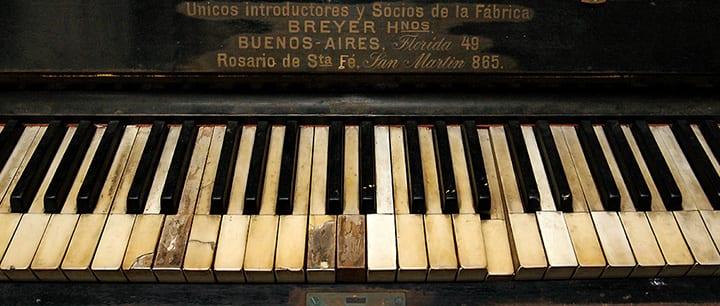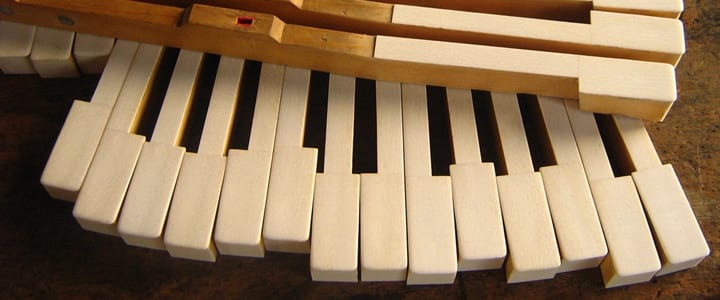The piano is, by nature, unethical, discuss.
For students in music programs or conservatories, this is a common essay prompt you’ll come across. But academic thoughts aside, it’s an issue worth thinking about for any piano player. Pianos pre-dating the 1950s are inexorably linked with the universally distasteful business of hunting for the purposes of obtaining ivory, whether legally or illegally. Read on to learn more about the history of instrument-making to see where the vogue for making piano keys from ivory originated–and then make an educated decision for yourself.
A Brief History of Keyboard Instruments
As early as the 1150s, keyboard instruments appear both in art and in record, and although they in no way resemble modern pianos, these early monochords and later clavichords are a definite early ancestor. The first written indication of something that may have resembled a modern instrument dates to 1598, where letters to the Duke of Modena describe an instrument as a “pian e forte,” meaning it was capable of soft and loud, like a modern day piano. Although it’s likely to have been a type of harpsichord rather than an instrument with hammer keys, the idea was born from there.
The piano didn’t really catch on as a popular instrument until the 1760s, aided by the rather prolific Bach family. With the piano becoming so popular that every genteel drawing room had an upright, so did the demand for ivory, which had been used to cover the keys since the early 1700s.
As time went on–and the Great Depression of the 1920s hit–many manufacturers began using plastic in place of ivory, as it was a less expensive alternative. Manufacturers also found that plastic was easier to work with, and less prone to damage. By the 1950s, most piano makers had made the switch to plastic, and later, in 1989, ivory was outright banned.
How Do I Tell if My Piano Keys Are Made From Ivory?
Most modern-day pianos use plastic, although some higher-end brands use resin, which is more resistant to chipping and yellowing. If you have an older piano, however, there are ways you can tell if the keys are made from ivory. One way is to look for “veins” on the surface: ivory keys will have a fine line between the keytop and the stem, as they’re produced in three parts (key, stem, and front).
Should I Avoid Antique Pianos?
If you are concerned about the rights and wrongs of what you buy, then as a pianist you are probably torn between the beauty (and some would argue superiority) of ivory keys over plastic. It’s a strong ethical dilemma, as well as an active, ongoing discussion within the piano community.
The truth is, if you are in possession of a piano built pre-1950, your piano keys are almost certainly covered with ivory. There’s also the consideration of maintenance and repair–ivory keys should be replaced with ivory keys, both to maintain the value of the instrument, and for aesthetic reasons. The realistic view to take is that the animal from which the ivory was taken would be long dead by now anyway, and that there is a thriving trade in antique replacement piano keys taken from instruments long beyond repair, so no new ivory is being acquired for the purpose.
However, if you feel strongly about illegal poaching, or even just about the use of animals for consumer purposes, it can be hard to process. If you have a much-loved inherited antique, and feel strongly against the ivory keys, one option is to get a quote from your piano technician for how much it would cost to replace them. Modern instruments are state-of-the-art masterpieces of design and innovation, and modern plastics used to cover the keys are now– depending on which pianists you talk to–equal if not superior to ivory in terms of touch and responsiveness.
Staying Ethical
You may remember reading about the Bechstein story, where the reproduction of a 160-year-old instrument made for Queen Victoria turned into a worldwide scandal, when new ivory was used for the keys. With around 17,000 elephants being poached each year solely for their tusks, even the most pragmatic musicians found this to be a rather surprising and controversial decision.
So which makers should you go to for reassurance that your piano will be cruelty-free? Perhaps the biggest name in piano manufacturing–Steinway–may both surprise and reassure you. All Steinway piano keys are made from white plastic. Less starry, but equally ethical is Baldwin, maker of affordable yet highly-responsive and desirable uprights.
Ultimately, the decision is up to you–you may consider that the recycling of a now questionable animal by-product is a small ethical price to pay to reduce ongoing demand, and be happy to maintain your antique instrument this way. However, you may feel that the real danger is in the perpetuation of “tickling the ivories,” and until all piano keys are plastic, the problem remains.
What do you think about this hot-button issue? Leave your thoughts in the comments!
Photo by Vince Alongi, Hoder Slanger
Suzy S.



